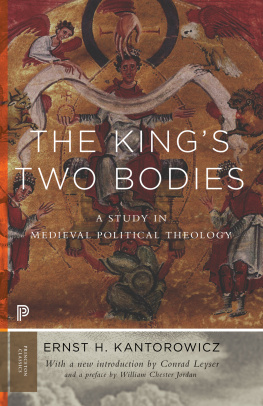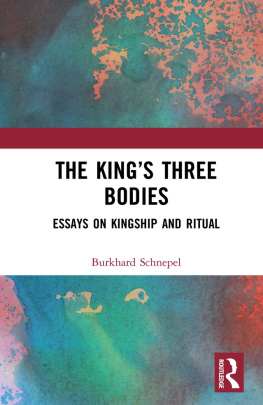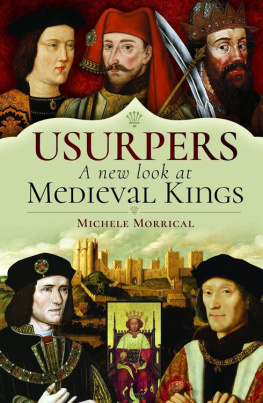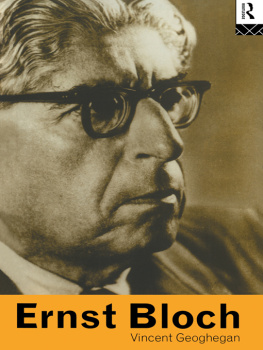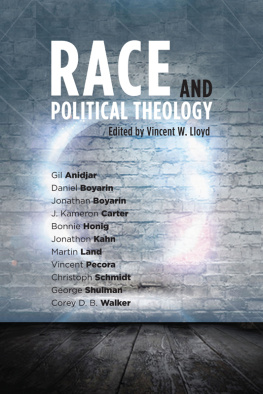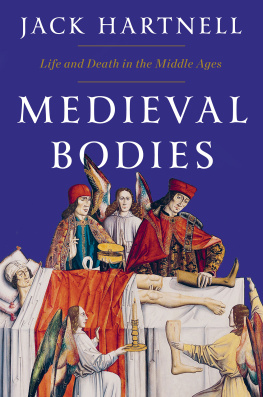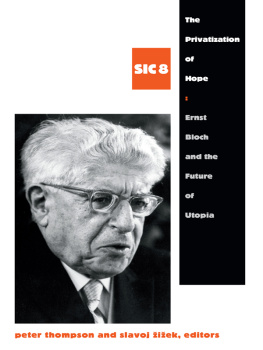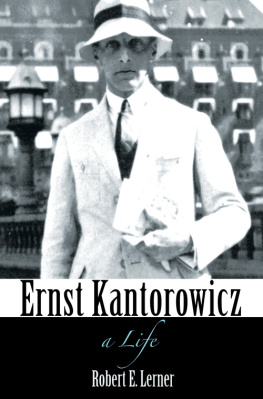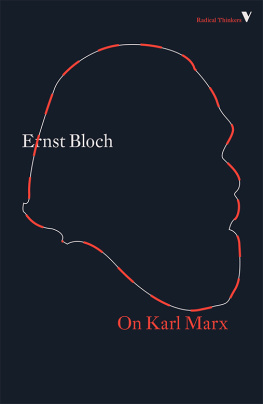Kantorowicz Ernst - Kings two bodies - a study in medieval political theology
Here you can read online Kantorowicz Ernst - Kings two bodies - a study in medieval political theology full text of the book (entire story) in english for free. Download pdf and epub, get meaning, cover and reviews about this ebook. year: 2016, publisher: Princeton University Press, genre: Art. Description of the work, (preface) as well as reviews are available. Best literature library LitArk.com created for fans of good reading and offers a wide selection of genres:
Romance novel
Science fiction
Adventure
Detective
Science
History
Home and family
Prose
Art
Politics
Computer
Non-fiction
Religion
Business
Children
Humor
Choose a favorite category and find really read worthwhile books. Enjoy immersion in the world of imagination, feel the emotions of the characters or learn something new for yourself, make an fascinating discovery.
- Book:Kings two bodies - a study in medieval political theology
- Author:
- Publisher:Princeton University Press
- Genre:
- Year:2016
- Rating:3 / 5
- Favourites:Add to favourites
- Your mark:
- 60
- 1
- 2
- 3
- 4
- 5
Kings two bodies - a study in medieval political theology: summary, description and annotation
We offer to read an annotation, description, summary or preface (depends on what the author of the book "Kings two bodies - a study in medieval political theology" wrote himself). If you haven't found the necessary information about the book — write in the comments, we will try to find it.
Kings two bodies - a study in medieval political theology — read online for free the complete book (whole text) full work
Below is the text of the book, divided by pages. System saving the place of the last page read, allows you to conveniently read the book "Kings two bodies - a study in medieval political theology" online for free, without having to search again every time where you left off. Put a bookmark, and you can go to the page where you finished reading at any time.
Font size:
Interval:
Bookmark:

The Kings Two Bodies
THE KINGS TWO BODIES
A Study in Mediaeval Political Theology
BY
ERNST H. KANTOROWICZ
WITH A NEW INTRODUCTION
BY CONRAD LEYSER
PRINCETON UNIVERSITY PRESS
PRINCETON AND OXFORD
Published by Princeton University Press, 41 William Street,
Princeton, New Jersey
In the United Kingdom: Princeton University Press
6 Oxford Street, Woodstock, Oxfordshire OX20 1TR
Copyright 1957, by Princeton University Press;
Copyright renewed 1985 by Princeton University Press
Preface by William Chester Jordan copyright 1997 by Princeton University Press
Introduction to the Princeton Classics Edition by Conrad Leyser
2016 by Princeton University Press
All Rights Reserved
First Princeton Classics Edition printing, with a new introduction by Conrad Leyser, 2016
Seventh paperback printing, with a new preface by William Chester Jordan, 1997
Paper ISBN: 978-0-691-16923-1
Library of Congress Control Number: 2016934635
press.princeton.edu
Printed on acid-free paper
Printed in the United States of America
10 9 8 7 6 5 4 3 2 1
D. M.
MAXIMI RADIN
(MDCCCLXXX-MCML)
SACRUM
CONTENTS
PREFACE (1997) |
INTRODUCTION TO THE PRINCETON CLASSICS EDITION
READER BEWARE! Why should this be? Or is what have here a text clad in the emperors new clothes?
There are three contexts in which we can treat the question of the books continuing appeal and defend its value. The first is the magnetism of the authors own story as a German-Jewish migr. The second, connected, context is the books relationship to the development of history as a discipline, especially in the second half of the twentieth century. The third is intrinsic to the book itself. The Kings Two Bodies asks, precisely, about the naked emperor and his new clothes. How is it that rulers, humans like the rest of us, are able to hold sway? What kind of fictions are in place to enable some to command the allegiance, even the worship, of others?
KANTOROWICZS TWO SELVES
Ernst Hartwig Kantorowiczs story is recognizably that of the generation of assimilated and upwardly mobile Jews in early twentieth-century Germany. His patrons, meanwhile, succeeded in placing him as a chair in the History Department at Frankfurt in 1932.
The coming to power of the Nazis in the following year made Kantorowiczs position increasingly difficult, and eventually untenable. In the face of an organized student boycott of his lectures, he resigned in 1934, and in 1938, he left Germany. After various twists and turns, he took up a post in the History Department at Berkeley. Kantorowicz died in 1963.
What makes Kantorowiczs story so alluring is the degree of his participation in the German nationalist project. This constantly surprises us, perhaps more than it should. German Jews imagined no contradiction between their identities. By the end of the nineteenth century, socially ambitious Jews might name their children after German emperors, and they showed little interest in traditional religious observance.
Once settled in the United States, Kantorowicz drew a veil over all this. He did not like to talk about his past, his pupils noticed. The pansexual habits of central Europe gave way to the less demonstrative codes of central New Jersey. The books preface, however, puts forward a myth of origins in which the inspiration for the study came from a conversation in Berkeley with Max Radin, another migr, dated, aptly and safely, to 1945.
Kantorowiczs attempt to blank his German past has had unfortunate consequences. The former is the author of Kaiser Friedrich der Zweite, a work of youthful excess, the latter writes the scholarly monument that is The Kings Two Bodies.
Cantors account (here and elsewhere) was a tissue of falsehoods and half-truths, but for better or for worse, Kantorowiczs disciples took the bait and defended him strenuously.
The 1990s furore has now subsided. In passing from a first- to a second-generation community of memory, we see more clearly, perhaps, how the two Kantorowiczes can be reintegrated. The book is also, and by the same token, a shadow play about political culture in the modern age.
OUR BODIES OURSELVES
The Kings Two Bodies today holds up a mirror to the modern historical profession. Its authors participation in reactionary critique of the Weimar Republic, and his subsequent attempt to mask the deep continuities across his work, plays back to us our own story: the professions complicated relationship with the nation-state, and our failure to escape it.
This is not the place for a full-blown account, but a brief review of familiar ground is in order. Across nineteenth-century Europe, historians put themselves at the service of political masters in return for professional recognition. They persuaded nation builders that what they had to offer was as valuable in the training of citizens as were the traditional disciplines of classics and theologyand that therefore governments should sponsor the establishment of research institutes and university professorships in history.
Medievalists were pivotal in this transaction. They curated the myth of nations, telling the story of how, in the fifth century, the Roman Empire ceded power to incoming barbarian peoples. This was the end of the ancient world, and the beginning of a new modern era. Rough and uncultured as these barbarians were, they nonetheless forged political structures based on recognizably modern principles of organized consultation, as opposed to the power wielded by the dynastic autocrats of the ancient world. The task of historians as researchers and teachers was to piece together the evidence for the process of national becoming.
This all proved overwhelmingly successful: history as a professional discipline was launched on a global scale. The strength of the model is perhaps best seen in the way it carried beyond Europe. In the US, the fable about the end of the Roman Empire had, of course, no geopolitical traction, given the absence of invading Germanic peoples on the American continent. American medievalists accordingly rerouted the myth of origins: they argued that the special creation of the Middle Ages was less the nation, than the university. Here was a route back to the intellectual culture of the Old World. The institutional forms for the study of the humanities in US universities were borrowed from Germany: when the migrs arrived in the 1930s, they were populating an infrastructural landscape already familiar to them.
In the aftermath of World War Two, history as a discipline, like Germany as a country, faced a challenge of reconstruction (Wiederaufbau) on a new basis: how to ensure that the resources of the past were never again put to such ideological abuse by a state. In 1962, in his inaugural lecture as Professor of Medieval History at Oxford, Richard Southern called for historians to study something other than the public doings of men.the 1960s and 70s, a whole new range of topics came into the purview of historical study: above all, race, gender, and sexuality. In the era before professionalization, in the pages of Edward Gibbon for example, all these had featuredbut they had been banished in the name of disciplinary rigor. Now they were back, carrying the future of the discipline.
Among these topics was the body. Beautifully designed and produced, the Zone list graced the Manhattan coffee table and the shelves of design-conscious intellectuals. Body history had arrived.
Not coincidentally, this was the point at which
Next pageFont size:
Interval:
Bookmark:
Similar books «Kings two bodies - a study in medieval political theology»
Look at similar books to Kings two bodies - a study in medieval political theology. We have selected literature similar in name and meaning in the hope of providing readers with more options to find new, interesting, not yet read works.
Discussion, reviews of the book Kings two bodies - a study in medieval political theology and just readers' own opinions. Leave your comments, write what you think about the work, its meaning or the main characters. Specify what exactly you liked and what you didn't like, and why you think so.

